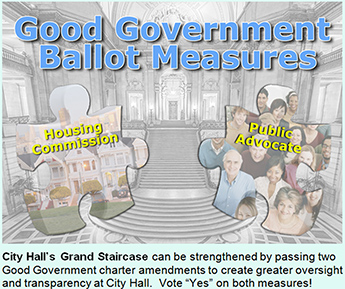 Article in Press Printer-friendly PDF file
Article in Press Printer-friendly PDF fileWestside Observer Newspaper
September 2016 at www.WestsideObserver.com
Open Govermnent: Two Crucial Ballot Measures
Support Housing Commission, Public Advocate
 Article in Press Printer-friendly PDF file
Article in Press Printer-friendly PDF file
Westside Observer
Newspaper
September 2016 at www.WestsideObserver.com
Open Govermnent: Two Crucial Ballot Measures
Support Housing Commission,
Public Advocate
by Patrick Monette-Shaw
Whether you live in San Francisco’s West Side, or elsewhere in the City, two “good government” measures on November’s municipal ballot — one to create a Commission having oversight of both the Mayor’s Office of Housing and Community Development (MOHCD) and the Mayor’s Office of Economic and Workforce Development (MOEWD), and one to create an elected Public Advocate — are crucial to open government in San Francisco. Both measures deserve your unqualified support.
Both measures are poised to be game-changing of the status quo when it comes to open government in San Francisco.
“Prop. M”: Housing and Development Commission Desperately Needed
As I have previously reported in the Westside Observer — in Affordability Mayor: A Housing Bait-and-Switch? in April 2014, Mayor’s Housing Scam Redux in April 2015, Housing Withers on the Vine in May 2015, and Affordable Housing Bond Measure Snookered Voters in June 2016 — there are a whole host of problems with the Mayor’s Office of Housing and Community Development (MOHCD) and the Mayor’s housing policies.
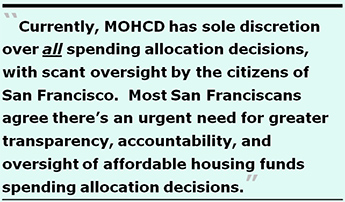 With “Prop. C” in 2012, voters mistakenly approved handing MOHCD sole discretion over how it will spend the $1.3 billion to $1.5 billion allocated to the City’s Housing Trust Fund (HTF) that will be diverted from the City’s General Fund (meaning some services and programs will have to be eliminated to re-allocate those General Funds to the HTF). It’s the same sole discretion handed to MOHCD in November 2015 with the $310 million Affordable Housing bond voters approved.
With “Prop. C” in 2012, voters mistakenly approved handing MOHCD sole discretion over how it will spend the $1.3 billion to $1.5 billion allocated to the City’s Housing Trust Fund (HTF) that will be diverted from the City’s General Fund (meaning some services and programs will have to be eliminated to re-allocate those General Funds to the HTF). It’s the same sole discretion handed to MOHCD in November 2015 with the $310 million Affordable Housing bond voters approved.
But documents and presentations prepared by MOHCD acknowledges it is overseeing nearly $3 billion in affordable housing funds flowing into San Francisco. Currently, MOHCD has sole discretion over all spending allocation decisions, with scant oversight by the citizens of San Francisco, other than a small oversight role over just public housing involving the successor agency to the former Redevelopment Agency.
Supervisor Mark Farrell’s Nonsense
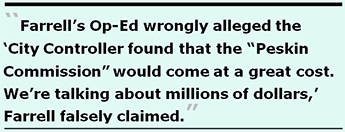 Supervisor Mark Farrell’s August 9, 2016 San Francisco Examiner Op-Ed — titled “New, costly ‘Peskin Commission’ is not the answer to the housing crisis” — opposing creation of a Commission having oversight over MOHCD and OEWD, is a classic example of an ad hominem attack, in which Farrell wrongly attacked Supervisor Aaron Peskin, rather than the position Peskin had floated. Farrell attacked Peskin as the “messenger,” rather than addressing Peskin’s “message”: That most San Franciscans agree there’s an urgent need for greater transparency, accountability, and oversight of affordable housing funds spending allocation decisions.
Supervisor Mark Farrell’s August 9, 2016 San Francisco Examiner Op-Ed — titled “New, costly ‘Peskin Commission’ is not the answer to the housing crisis” — opposing creation of a Commission having oversight over MOHCD and OEWD, is a classic example of an ad hominem attack, in which Farrell wrongly attacked Supervisor Aaron Peskin, rather than the position Peskin had floated. Farrell attacked Peskin as the “messenger,” rather than addressing Peskin’s “message”: That most San Franciscans agree there’s an urgent need for greater transparency, accountability, and oversight of affordable housing funds spending allocation decisions.
Indeed, “Prop. M” to establish the Housing Commission was co-sponsoredby Supervisors Peskin, Jane Kim, and Eric Mar, but Farrell chose to denigrate the matter by attributing it only to Peskin, as the “Peksin Commission,” and Farrell further chose to distort the truth.
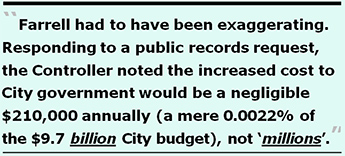 First, Farrell’s Op-Ed asserted the Housing Commission would be expensive, wrongly alleging the “City Controller found that the ‘Peskin Commission’ would come at a great cost. We’re talking about millions of dollars — and the taxpayers will be left holding the bag,” Farrell falsely claimed.
First, Farrell’s Op-Ed asserted the Housing Commission would be expensive, wrongly alleging the “City Controller found that the ‘Peskin Commission’ would come at a great cost. We’re talking about millions of dollars — and the taxpayers will be left holding the bag,” Farrell falsely claimed.
Farrell had to have been exaggerating, if not lying. In response to a public records request, the City Controller provided two nearly identical documents on August 15, in which the Controller noted the increased cost to City government would be a negligible $210,000 annually (a mere 0.0022% of the $9.7 billion City budget, far less than one-hundredth of one percent of the budget), not “millions.” The Controller’s first letter dated July 19, 2016 was to the Board of Supervisors when it was considering whether to place “Prop. M” on the ballot. The controller’s second letter dated August 15, 2016 was to the Department of Elections for inclusion as the “Controller’s Statement” in the official voter guide. Farrell — much like Donald Trump — doesn’t appear to understand the difference between “millions of dollars” and a piddly $210,000. And like Trump, Farrell appears to feel it’s OK to issue blatant distortions in a major media news outlet.
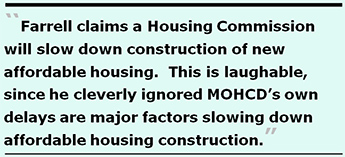 For that matter, if Farrell would drop his lawsuit against San Francisco’s Ethics Commission and the City, and simply pay the $191,000 fine the Ethics Commission assessed him for probable elections campaign violations, paying his fine would amount to 91% of the Housing Commission’s first-year budget of $210,000.
For that matter, if Farrell would drop his lawsuit against San Francisco’s Ethics Commission and the City, and simply pay the $191,000 fine the Ethics Commission assessed him for probable elections campaign violations, paying his fine would amount to 91% of the Housing Commission’s first-year budget of $210,000.
Second, Farrell claims having a Housing Commission will slow down construction of new affordable housing. This is laughable, given MOHCD’s own unnecessary delays. For instance, MOHCD has admitted to the Citizen’s General Obligation Bond Oversight Committee (CGOBOC) — which is mandated by the Bond measure to provide citizen oversight of the $310 million Affordable Housing bond passed just last November — on July 28 that the first “tranche” (a French term referring to a “slice,” or portion, issued in a multi-part bond series) planned for issuance in the second quarter of calendar year 2016 now won’t be issued until the fourth quarter, possibly in November 2016, a full year after voters passed the bond.
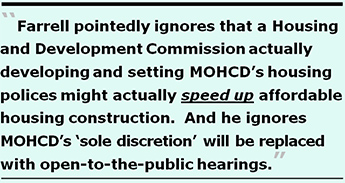 Farrell cleverly ignored MOHCD’s own delays are major factors slowing down affordable housing construction.
Farrell cleverly ignored MOHCD’s own delays are major factors slowing down affordable housing construction.
If there is any urgency to San Francisco’s current housing crisis, why is it taking MOHCD so long to issue the first bond tranche, and why is this of no apparent concern to Farrell? How has MOHCD’s delay issuing the bond further exacerbated, by slowing down, construction of new affordable housing?
Farrell pointedly ignores that having a Housing and Development Commission actually developing and setting MOHCD’s housing polices might actually speed up affordable housing construction. And he ignores that MOHCD’s “sole discretion” would be replaced by a requirement that the Housing Commission hold open-to-the-public hearings to develop a five-year plan for affordable housing projects, creating greater transparency and accountability to San Franciscans.
CGOBOC Member Concerns
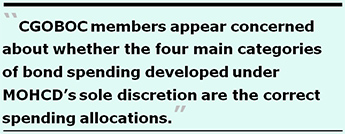 CGOBOC has held just two hearings since January 2016 on the $310 million Affordable Housing Bond, receiving status updates presented by MOHCD’s Kate Hartley on January 28 and July 28. A partial verbatim transcript of CGOBOC’s January meeting shows several of its members raised troubling concerns.
CGOBOC has held just two hearings since January 2016 on the $310 million Affordable Housing Bond, receiving status updates presented by MOHCD’s Kate Hartley on January 28 and July 28. A partial verbatim transcript of CGOBOC’s January meeting shows several of its members raised troubling concerns.
Member Brenda Kwee McNulty — appointed by the Board of Supervisors — raised a question last January regarding whether the “metrics” to assess spending of the bond will “shed some light into whether or not we made the right allocation decisions.” Clearly, CGOBOC members are concerned about whether the four main categories of bond spending developed under MOHCD’s sole discretion — for Public Housing, Mission District Housing Plan, Low-Income Housing, and Middle-Income Housing — and various sub-categories for specific projects are the correct spending allocations.
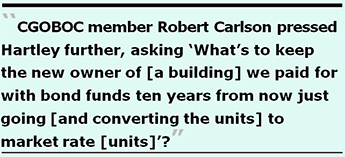 For his part, member Robert Carlson — appointed by the City Controller as someone with experience in public finance law or auditing government financial statements — raised a number of concerns in January, including that he hadn’t seen in Kate Hartley’s January 28 presentation “any sort of metrics by which [CGOBOC] or citizens can … judge the impacts of the $310 million in terms of producing affordable housing or preserving affordable housing.”
For his part, member Robert Carlson — appointed by the City Controller as someone with experience in public finance law or auditing government financial statements — raised a number of concerns in January, including that he hadn’t seen in Kate Hartley’s January 28 presentation “any sort of metrics by which [CGOBOC] or citizens can … judge the impacts of the $310 million in terms of producing affordable housing or preserving affordable housing.”
Carlson also expressed concern about who would own the rent-controlled units in buildings purchased using bond funds. Carlson pointedly asked “… For example, the $20 million for the purchase of rent-controlled units, when you purchase [those buildings] with these bond funds, who owns that building?” Hartley responded saying “the non-profit developers would own the building.”
Carlson pressed Hartley further, asking “What’s to keep the new owner of [a building] we paid for with bond funds ten years from now just going [and converting the units] to market rate [units]? Hartley responded saying there would be “permanent deed restrictions” to prevent flipping the units from below-market-rate units or “affordable” units, to market-rate units. But some real estate professionals worry that permanent deed restrictions can be, and have been, broken in the past.
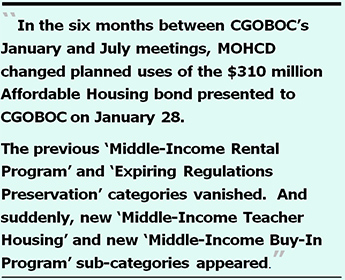 MOHCD’s July Bait-and-Switch
MOHCD’s July Bait-and-Switch
An analysis I prepared in July raises serious questions for CGOBOC members and members of the public. In the six months between CGOBOC’s January and July meetings, MOHCD changed planned uses of the $310 million Affordable Housing bond presented to CGOBOC on January 28. The previous “Middle-Income Rental Program” and “Expiring Regulations Preservation” categories appear to have vanished from the “Middle-Income” main category, and a previously proposed “Catalyst Top Loss” accelerator fund disappeared, too.
Suddenly, new “Middle-Income Teacher Housing” and new “Middle-Income Buy-In Program” sub-categories appeared in the “Middle-Income” main category on July 28, probably replete with market-rate units. Hartley noted on July 28 that several of the four main categories of planned uses will include market-rate units.
Fully 18 months into planning for uses of the bond, why are these spending categories still shifting at MOHCD’s sole discretion, without CGOBOC’s foreknowledge?
Olson Lee’s Gravitas … and Stonewalling Under the Color of “Sole Discretion”
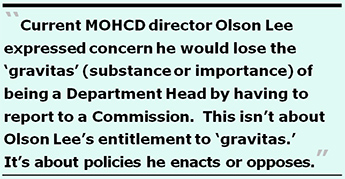 At the Board of Supervisors Rules Committee meeting on June 30 and reported in the San Francisco Examiner, current MOHCD director Olson Lee expressed his concern that he would lose the “gravitas” (substance or importance) of being a Department Head by having to report to a Commission, rather than reporting directly to the Mayor. Olson Lee ignored that public officials in both Washington and Sacramento routinely deal with San Francisco “department heads” who report to a Commission, such as Barbara Garcia at the Department of Public Health, LeeAnn Pelham at Ethics, Joanne Hayes-White at the Fire Commission, former Police Chief Greg Suhr at the Police Commission, Phil Ginsburg at the RPD Commission, or City Librarian Luis Herrera at the Library Commission, among many others.
At the Board of Supervisors Rules Committee meeting on June 30 and reported in the San Francisco Examiner, current MOHCD director Olson Lee expressed his concern that he would lose the “gravitas” (substance or importance) of being a Department Head by having to report to a Commission, rather than reporting directly to the Mayor. Olson Lee ignored that public officials in both Washington and Sacramento routinely deal with San Francisco “department heads” who report to a Commission, such as Barbara Garcia at the Department of Public Health, LeeAnn Pelham at Ethics, Joanne Hayes-White at the Fire Commission, former Police Chief Greg Suhr at the Police Commission, Phil Ginsburg at the RPD Commission, or City Librarian Luis Herrera at the Library Commission, among many others.
This isn’t about Olson Lee’s sense of entitlement to “gravitas.” It’s about the policies he enacts or opposes. Mr. Lee, appointed by Mayor Lee, has served since July 2011 as MOHCD’s Executive Director while on leave from the San Francisco Redevelopment Agency; previously he had been the Redevelopment Agency’s Deputy Executive Director for 15 years. San Franciscans have endured Olson Lee for well over 20 years in various roles developing public housing.
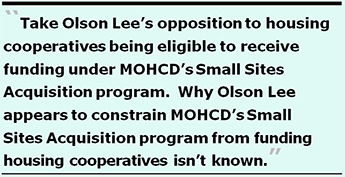 Olson Lee has carte blanche to develop planned affordable housing projects at MOHCD’s sole discretion.
Olson Lee has carte blanche to develop planned affordable housing projects at MOHCD’s sole discretion.
Take, for instance, Olson Lee’s opposition to housing cooperatives being eligible to receive funding under MOHCD’s Small Sites Acquisition program, despite both Mayor Lee’s and the Planning Department’s assertions housing co-ops are a definitive form of affordable housing. In many sections, San Francisco’s 2014 Housing Element consistently calls for including “housing cooperatives” for support, and presumably, for funding.
The Planning Department’s Housing Element is part of San Francisco’s General Plan seeking to ensure adequate housing for San Franciscans. Housing element law requires that local governments plan for their existing and projected housing needs, by providing opportunities for housing development, rather than constraining opportunities. Why Olson Lee appears to want to constrain MOHCD’s Small Sites Acquisition program from funding housing cooperatives isn’t known.
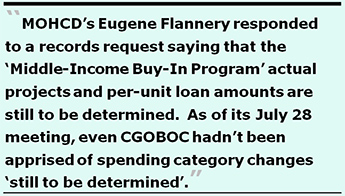 On July 25, MOHCD’s Eugene Flannery responded to a records request saying that the “Middle-Income Buy-In Program” represents MOHCD’s intention to include middle income units in a variety of mixed-income developments. “These funds will be disbursed as long-term loans, at below-market interest rates. Anticipated project types receiving the funds will include developments combining low-income and middle-income units; market-rate and middle-income units; and market-rate, middle-income, and low-income units. The goal is to combine the bond proceeds with the best available leveraged financing in order to maximize the production of middle-income units. Actual projects and per-unit loan amounts are still to be determined,” Flannery noted. As of its July 28 meeting, even CGOBOC hasn’t been apprised of spending category changes “still to be determined.”
On July 25, MOHCD’s Eugene Flannery responded to a records request saying that the “Middle-Income Buy-In Program” represents MOHCD’s intention to include middle income units in a variety of mixed-income developments. “These funds will be disbursed as long-term loans, at below-market interest rates. Anticipated project types receiving the funds will include developments combining low-income and middle-income units; market-rate and middle-income units; and market-rate, middle-income, and low-income units. The goal is to combine the bond proceeds with the best available leveraged financing in order to maximize the production of middle-income units. Actual projects and per-unit loan amounts are still to be determined,” Flannery noted. As of its July 28 meeting, even CGOBOC hasn’t been apprised of spending category changes “still to be determined.”
How did we get to the point that MOHCD will be issuing long-term loans at below-market interest rates to build market-rate housing? After all, Mayor Lee’s November 2015 voter guide “Proponent Argument” in favor of the bond clearly said “ ‘NOT ONE CENT’ FOR LUXURY CONDOS. All the funds go directly toward building more housing for low-income and middle-class families.” Inexplicably, MOHCD is now proposing to build market-rate housing, another bait-and-switch.
 This goes a long way towards explaining why the Housing Balance Report that Supervisor Jane Kim had required be developed shows a great imbalance between “market-rate,” “affordable,” and “low-income housing” units has grown over the years, perhaps due to MOHCD’s “sole discretion” to award funding for affordable housing projects.
This goes a long way towards explaining why the Housing Balance Report that Supervisor Jane Kim had required be developed shows a great imbalance between “market-rate,” “affordable,” and “low-income housing” units has grown over the years, perhaps due to MOHCD’s “sole discretion” to award funding for affordable housing projects.
By its own admission, MOHCD’s annual report for FY 2014–2015 notes that between 2007 and 2014, San Francisco met only a fraction of its Regional Housing Need Assessment (RHNA) goals of housing production. The annual report notes 108.7% of Above Moderate Income units (greater than 120% of Area Median Income, or AMI) were built in that seven-year period (read: Market-Rate Housing), but only 19.0% of Moderate Income units (between 80% and 120% of AMI) and only 47.7% of Low-Income units 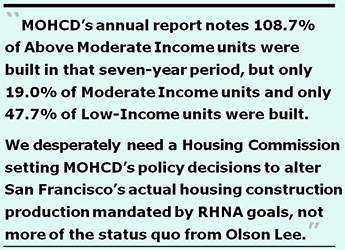 (less than 80% AMI) were built.
(less than 80% AMI) were built.
Overall, just under two-thirds — 65.6% — of the RHNA target units were built in the 2007–2014 seven-year period, with just 20,455 units constructed of the RHNA 31,193 units goal.
We desperately need a Housing Commission setting MOHCD’s policy decisions to alter San Francisco’s actual housing construction production mandated by RHNA goals, not more of the same status quo from Olson Lee.
Developers Masquerading as Housing Advocates
Peter Cohen and Fernando Marti — co-directors of San Francisco’s Council of Community Housing Organizations (CCHO) — noted in their July 27, 2016 San Francisco Examiner Op-Ed, that “As long as developer front groups masquerading as ‘housing advocates’ and some politicians continue to chase after false solutions based on 1980’s-era deregulation policies, they will fail to meet the increasingly dire housing needs of Californians.”
There are anecdotal and credible reports that MOHCD has approved loans to “regular” (i.e., for-profit) developers, not just to non-profit developers. Notably, during CGOBOC’s Jul 28 meeting, Hartley admitted that MOHCD has approved loans to include market-rate units in projects to help pay down so-called “Certificates of Participation” and that there will be 600 new market-rate 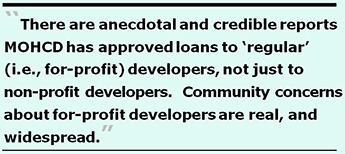 units involved in the Sunnydale public housing reconstruction.
units involved in the Sunnydale public housing reconstruction.
Community concerns about for-profit developers are real, and widespread. Housing advocates fear that if something goes wrong with projects involving for-profit developers — say discovering part-way into a project there’s an underground water reservoir to deal with they hadn’t known about, or other costly unforeseen site conditions to correct — they may pull out of a given project and may simply disappear, leaving the City on the hook financially to complete a project. For-profit developers masquerading as ‘housing advocates,’ as Cohen and Matri worry, are a legitimate concern.
George Wooding, president of the Coalition of San Francisco Neighborhoods (CSFN), says:
“San Franciscans must remember MOHCD is the ‘black hole’ of bad governance. The more ‘bad’ loans City Hall issues to private, for-profit developers, the more bad debt San Franciscans will end up assuming. Should developers abandon failing projects, the City will be responsible for covering costs, making MOHCD the “Fannie May and Freddie Mac” of our City.”
 Under Olson Lee’s “leadership,” MOHCD seeks to preserve the status-quo of his own making. It’s time to enact a Housing Commission and get rid of Olson Lee’s tired excuses. San Francisco desperately needs greater transparency and accountability with our scarce Affordable Housing funding. A Housing and Development Commission will go a long way toward providing greatly needed and increased oversight, and policy development guidance.
Under Olson Lee’s “leadership,” MOHCD seeks to preserve the status-quo of his own making. It’s time to enact a Housing Commission and get rid of Olson Lee’s tired excuses. San Francisco desperately needs greater transparency and accountability with our scarce Affordable Housing funding. A Housing and Development Commission will go a long way toward providing greatly needed and increased oversight, and policy development guidance.
Wooding added: “San Franciscans don’t want Olson Lee determining behind closed doors the financial health of San Francisco. We deserve strong oversight, transparency, and accountability over MOHCD.”
Endorsements for “Prop. M”
To date, notable endorsements in favor of “Prop. M” include CSFN, the Harvey Milk Democratic Club, San Francisco’s Latino Democratic Club, and San Francisco’s Democratic County Central Committee (DCCC) on a vote of 16 to 8 to support, among others. It is thought that the expert Messrs. Cohen and Marti, and perhaps CCHO itself, may also be supportive of creating a Commission having oversight over MOHCD, but that has not verified as of press time. Please join these organizations, and I, and vote “Yes” on “Prop. M”!
“Prop. H”: Public Advocate
Given decades of soft-corruption in San Francisco that has largely gone uncorrected, it’s clear that San Franciscans deserve to have an elected Public Advocate to champion reforms. It’s time San Francisco joins New York City, Portland, and Seattle in creating a Public Advocate. New York saved $170 million alone in 2015 by investigating bad city contracts.
Supervisor David Campos, “Prop. H’s” principal author, says:
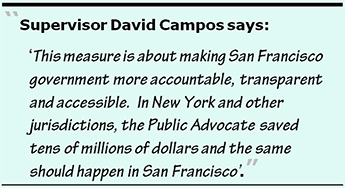 For far too long, San Francisco city departments have been run without sufficient public accountability, seeking to preserve the status quo. Obviously, many City Hall family members and many former San Francisco mayors want to keep it that way: Accountability- and oversight-free. “Prop H” will restore checks and balances at City Hall that are clearly missing.
For far too long, San Francisco city departments have been run without sufficient public accountability, seeking to preserve the status quo. Obviously, many City Hall family members and many former San Francisco mayors want to keep it that way: Accountability- and oversight-free. “Prop H” will restore checks and balances at City Hall that are clearly missing.
Currently, San Francisco doesn’t have a central office responsible for overseeing how City departments interact with members of the public, or for reviewing administration of programs by City agencies. Under “Prop. H,” a Public Advocate will receive, investigate, and attempt to resolve complaints from members of the public concerning City services, programs, or activities.
Although each member of the Board of Supervisors has legislative aides, those aides are principally focused on developing district-level and citywide legislation, and other policymaking work, and are only secondarily focused on addressing constituent concerns in their respective districts.
The Board’s current legislative aides have next to no authority to perform investigations into various programs and services throughout the City.
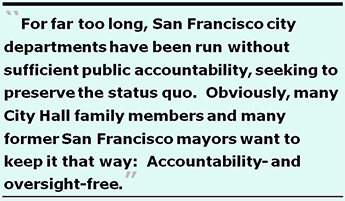 The Public Advocate will be charged with performing both constituent services and investigations of City programs and services, including the distribution and mix of programs and services throughout the City, effectiveness of public information and service complaints about City agencies, and responsiveness of City agencies. In addition, the Public Advocate will be authorized to review the management and employment practices of City officers and departments that promote or impede effective and efficient operation of City government, and will be authorized to review the City’s contracting procedures. And the Public Advocate will be authorized to conduct performance audits of City departments, services, and programs. Currently, none of this work is routinely, or consistently, performed.
The Public Advocate will be charged with performing both constituent services and investigations of City programs and services, including the distribution and mix of programs and services throughout the City, effectiveness of public information and service complaints about City agencies, and responsiveness of City agencies. In addition, the Public Advocate will be authorized to review the management and employment practices of City officers and departments that promote or impede effective and efficient operation of City government, and will be authorized to review the City’s contracting procedures. And the Public Advocate will be authorized to conduct performance audits of City departments, services, and programs. Currently, none of this work is routinely, or consistently, performed.
The Public Advocate will be authorized to introduce legislation at the Board of Supervisors regarding any matter within the Advocate’s jurisdiction.
In addition, the Public Advocate will have authority to investigate expanded whistleblower complaints. Currently, the City Controller has authority to receive and investigate individual whistleblower complaints concerning: The misuse of City funds by officers or employees; the use of City equipment or time for personal purposes; the purchase of unneeded supplies or equipment; nonperformance, or inadequate performance of, contractually-required services; or, improper or wasteful activities by City officers or employees; and the quality and delivery of government services, wasteful and inefficient City government practices, misuse of City government funds, and improper activities by City government officers and employees.
 “Prop. H” expands the scope of the whistleblower program, by giving the Public Advocate authority to receive complaints by members of the public concerning: Incorrect, unreasonable, or unfair decisions or rulings of City officers or agencies; inconsistent enforcement, or failure to enforce, laws, rules, or regulations; poor or inadequate service delivery or treatment; poor communication, including unreasonably long response or wait times and unreasonable response delays; and inequitable or inefficient provision of City services.
“Prop. H” expands the scope of the whistleblower program, by giving the Public Advocate authority to receive complaints by members of the public concerning: Incorrect, unreasonable, or unfair decisions or rulings of City officers or agencies; inconsistent enforcement, or failure to enforce, laws, rules, or regulations; poor or inadequate service delivery or treatment; poor communication, including unreasonably long response or wait times and unreasonable response delays; and inequitable or inefficient provision of City services.
“Prop. H” provides that the Public Advocate and City Controller may shift between themselves (by written agreement) jurisdictional responsibilities for investigating and reporting various types of whistleblower complaints.
 The Public Advocate will assess progress of City departments in developing effective customer service plans. Finally, “Prop. H” will rename the Police Department’s Office of Citizen’s Complaints to the “Department of Police Accountability” (DPA). The Police Commission will eventually recommend nominees for the Director of the DPA to the Public Advocate — subject to Board of Supervisors confirmation — rather than being a mayoral appointee.
The Public Advocate will assess progress of City departments in developing effective customer service plans. Finally, “Prop. H” will rename the Police Department’s Office of Citizen’s Complaints to the “Department of Police Accountability” (DPA). The Police Commission will eventually recommend nominees for the Director of the DPA to the Public Advocate — subject to Board of Supervisors confirmation — rather than being a mayoral appointee.
While some argue we have an Ethics Commission, they ignore that Ethics’ principal mandates are to investigate campaign finance-related violations and a limited amount of government conduct violations. Ethics does not investigate issues the Public Advocate will address, nor does it go to bat for the myriad of concerns raised by regular citizens. Clearly, “Prop. H” is a good government measure. The Public Advocate will be a long-overdue independent watchdog!
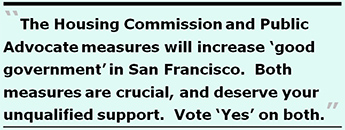 Endorsements for “Prop. H”
Endorsements for “Prop. H”
Monette-Shaw is an open-government accountability advocate, a patient advocate, and a member of California’s First Amendment Coalition. He received a James Madison Freedom of Information Award from the Society of Professional Journalists-Northern California Chapter in 2012. He can be contacted at monette-shaw@westsideobserver.